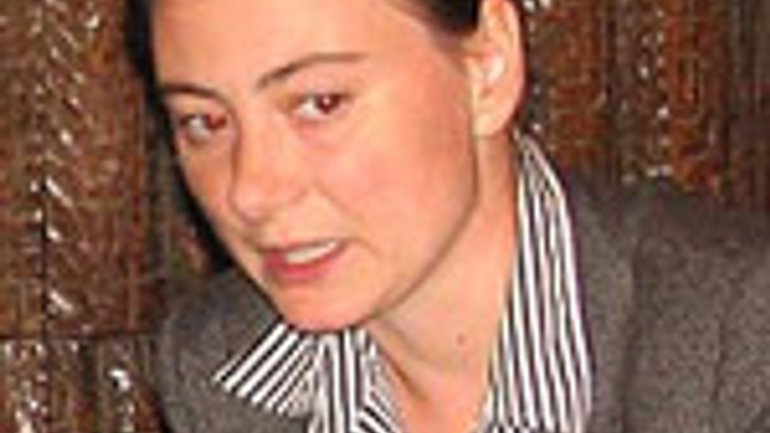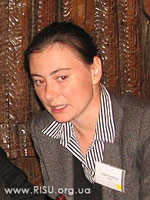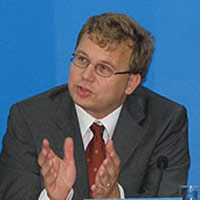J?rg L?er: “A society as well as individuals cannot be in peace with themselves without walking the path of facing the truth”

 Lesya Kovalenko, president of the Justice and Peace Commission of the Ukrainian Greek Catholic Church (UGCC) is speaking with Jörg Lüer,head of the Maximilian Kolbe Foundation and organizer of European workshops in Auschwitz. The Ukrainian delegation is made up of Oleh Turyi (his commentary RISU published recently), vice rector of the Ukrainian Catholic University, (UCU) and the Rev. Ihor Shaban, president of the Ecumenical Commission of the UGCC. Advisors of the Justice and Peace Commission of the UGCC participated in the first workshop in August 2010.
Lesya Kovalenko, president of the Justice and Peace Commission of the Ukrainian Greek Catholic Church (UGCC) is speaking with Jörg Lüer,head of the Maximilian Kolbe Foundation and organizer of European workshops in Auschwitz. The Ukrainian delegation is made up of Oleh Turyi (his commentary RISU published recently), vice rector of the Ukrainian Catholic University, (UCU) and the Rev. Ihor Shaban, president of the Ecumenical Commission of the UGCC. Advisors of the Justice and Peace Commission of the UGCC participated in the first workshop in August 2010.
The Justice and Peace Commission of the UGCC has been working intensively on the issues of healing the burdened memory and reconciliation and has therefore gladly accepted the invitation to the workshop.
A week ago you organized a workshop in Auschwitz. As I understand there are many workshops going on in/about Auschwitz. What was special about yours?
 There were several features. Firstly, we really focused on the place, trying to understand its particular genius loci, because experience shows that the places themselves are an extremely inspiring starting point of reflection. Therefore it has been important to us to have a lot of time to visit, to reflect, and to discuss in the places of extermination. Most of the visitors of the State Museum are coming for just some hours. We had five days. That makes a difference. Secondly, we organized the workshop in a way that discussions about Auschwitz always meant reflecting on ourselves, which also included a self-critical reflection on the role of the church in processes of dealing with a violent burdened past. Thirdly, the participants came from nine different European countries (Our friend from Uganda could not attend the meeting because of visa problems). We used this variety of experiences, backgrounds, and perspectives to explore the dimensions of Auschwitz-Birkenau more deeply.
There were several features. Firstly, we really focused on the place, trying to understand its particular genius loci, because experience shows that the places themselves are an extremely inspiring starting point of reflection. Therefore it has been important to us to have a lot of time to visit, to reflect, and to discuss in the places of extermination. Most of the visitors of the State Museum are coming for just some hours. We had five days. That makes a difference. Secondly, we organized the workshop in a way that discussions about Auschwitz always meant reflecting on ourselves, which also included a self-critical reflection on the role of the church in processes of dealing with a violent burdened past. Thirdly, the participants came from nine different European countries (Our friend from Uganda could not attend the meeting because of visa problems). We used this variety of experiences, backgrounds, and perspectives to explore the dimensions of Auschwitz-Birkenau more deeply.
There were Germans, Irish, Bosnians, French and others. Why was it important to have Ukrainians with you?
The Ukrainian participants were the only participants coming from a former Soviet country. The Soviet and post-Soviet experience is quite different from the classical central European experience but it is crucial if one wants to understand WWII and also the development of memory about Auschwitz and the war up to now. Besides, Ukraine is going through an extremely challenging process of coming to terms with its history. Therefore Ukrainians have a lot to contribute to European discussions. Without this contribution something really important would be missing. On the other hand, I would not exclude the possibility that Ukrainians also can get something helpful from this sort of discussions.
This is the second time (at least of what I know) that you are coming up with an idea of European workshops on memory and reconciliation. When you were the Secretary General of the European Justice and Peace network, you proposed the program for three years (2006-2008): “Memory. Truth. Justice.” Thus, representatives of 32 European countries have met in Sarajevo, Belfast, Kyiv, and Belgrade. It has been an amazing experience. What was your main motivation for this program?
Indeed the experiences we made during the mentioned program were encouraging and inspiring. We learned how important it is to build networks and to expose ourselves to a certain extent to problems we try to face. Coping with this sort of history is nothing abstract. It is always a concrete thing and part of coping with today’s problems and challenges. Since our foundation stands in the tradition of German-Polish reconciliation and in particular in the tradition of the Maximilian-Kolbe-Werk, it has been natural to us to start our European work in Auschwitz.
How important is dealing with the difficult past for the identity of the German, Ukrainian, Italian, Serb, etc? For the European identity? And what about faith: would it be very Catholic to stress the importance of memory and the past? How would you rate the importance of memory for the church from 1 to 10?
From my experience there is no real alternative to facing the whole history, because otherwise we will not be able to understand, respect, and appreciate our neighbors and ourselves. It is a question of healing and building mutual confidence and a relationship; it may sometimes be painful but in a spiritual way is unavoidable. It is not just memory. It is rather about how we deal with memories and wounds. You can use it as a weapon and you can use it to start a deeper reflection on reality. The church teaches, driven by a long and wise experience, that neither our sins nor our sufferings will have the last word. They are important and cannot be neglected but we have to be open to another reality. That’s sometimes very challenging to accept that we have to change.
When was the first time you were in Auschwitz? Why were you? What were the lessons you have learned? Four years ago you were in Babyn Yar and Bykivnja. What impressions did these places make on you? You met some of the survivors and heard their stories. What has stuck in your memory? What have you learned from the painful Ukrainian totalitarian past?
The first time I came to Auschwitz was in 1987. I came there from West Germany in order to do my civil service. From all the important lessons I learned in this time (also about what communist reality means), I want to stress that the experience showed me that we are not imprisoned by our history as long as we are able to face it. For example, my host, a former partisan in the Polish resistance, and I were quite different but sharing our impressions, questions, and experiences we became friends and we created a new, although small, meaningful reality.
Regarding Ukraine. The most striking experience I had during our visits to the places mentioned was the brokenness of the places. One could feel the necessity to come to terms with the history behind but also the impact of those trying to hide the whole truth. This impression was deepened by meeting the survivors. You could see how important the readiness of others to listen was to them. Not listening means the continuation of the brutal disrespect they suffered. But beside these touching experiences it has been extremely encouraging to see our Ukrainian friends facing theses challenges in a professional and compassionate way.
There are quite a few survivors of the Holodomor (the famine in Ukraine 1932-33 was recognized as genocide by some parliaments) and there will be less and less survivors of WWII every year. How would it be possible to keep the memory alive without the victims themselves, eyewitnesses, and those who saved the others?
Actually I think our problem today and tomorrow is not so much keeping the memory. Memories and narratives are still vivid in the society. The question is rather which culture of coping with memories and narratives do we built. In this context the documentation of testimonies are extremely helpful. They are concrete signs of respect for human beings. We need to create spaces were we can reflect commonly on today’s meaning of this history. I am always afraid when memory becomes just affirmative.
Lately, there appeared a couple of documentaries from the Council of Europe condemning communism and putting the equal sign between Nazism and communism. What is your opinion? Is that right that the “old” Europe treated communism (and all its evil) as a “better evil”?
The tendency to quarrel about the equal sign seems to me on the one hand a bad heritage of the Cold War. It is often an attempt to get ideological hegemony. On the other hand, it gives expression to the right and necessary insight that we cannot stop at the condemnation of fascism but at the same time we cannot put everything in one box. We have to be precise if we like to understand the phenomena.
In my opinion, both Nazism and Stalinism reached a level of evil that it does not make sense to distinguish them ethically. There is no better or worse in a general moral perspective. In historical, cultural, and political perspectives there are obviously many differences. For instance, it is not difficult to understand that many of our Jewish friends have different feelings regarding Nazism and Stalinism. Theses differences are part of the painful history we have to cope with. So we should learn to understand these different approaches rather then to discriminate them. Things become more complicated when we talk about the broader phenomena of fascism and communism. I do not see too much hermeneutic sense in putting the equal sign between these phenomena. They are evil from themselves not because of the other system.
The dividing line in this discourse is not between “old” and “new” Europe. The dividing line in this discussion runs through all our societies.
Two recent German movies (“The Lives of Others,” 2008 and “The White Ribbon,” 2009) do, however, very differently tell a story about the Germans' “burdened past,” even form the perspective of violence in childhood. If you were to make a movie, what would it be about?
Personally I am very happy with the film of Robert Thalheim “Am Ende kommen Touristen” (“And Along Come Tourists,” 2007). Robert was a volunteer in Oswiecim in the early 90s and he made an excellent film on the problems of coping with the past. I guess it would be worth continuing this reflection.
Would you bring your son to Auschwitz and what would you tell him?
Yes and no. I would never push or force him. If you go there it has to be out of your free will. But of course I will encourage him in a decent way. Since every generation has to define its particular relationship to history, it is important for me to create a space for doing this. Knowing by personal experience how important an intergenerational dialogue is, I will be open to answer to his questions. But before providing my answers he should find his questions.
Two days ago Ukraine celebrated 19 years of independence. Our new parliament is about to deny that the Holodomor is genocide and the public debate about rethinking our past slows down. In your opinion, could a country build its future without facing its own painful memory? Should the church take some actions in this regard?
I think in the case of historical events it is neither the task of politicians nor the church to decide whether we have to do with mass crimes or genocide. This is something we should leave to the historians first. But the church should be aware of the immense impact any attempt of falsifying or silencing history and hiding crimes has on the moral and spiritual feeling and education of the people. A society as well as individuals cannot be in peace with themselves without walking the path of facing the truth. Usually we are doing this just step by step and we have to stand the continuous temptation to stop after every step. The church should play an encouraging role in these personal and societal processes. This includes of course questions about the particular role of the church in history. If we do not include ourselves in this reflection we will not gain the credibility needed for real attention.
What is the main idea of the document “Memory and Reconciliation: Church and the faults of the past”? At the beginning of this year we translated the document. What would be the best way to study it?
The document you mentioned is extraordinarily interesting in a variety of perspectives. The first purpose of this document is to explain the great act of Pope John Paul II in 2000 when he confessed the guilt of members of the church in history and asked for forgiveness. Deeply rooted in the church and its traditions it has been nevertheless something new in church history and therefore is has been pretty confusing to a lot of people.
Reading the document you see and feel the immense struggle – sometimes even resistance – in the church regarding this confession. Beside many deep theological insights you can learn about how fundamentally challenging this act of John Paul II was and still is for many in the church. If we understand this challenge and the corresponding resistance better, we will make a great step forward in contributing to the healing processes in our societies.
Tiredness from painful subjects of history is observed in the public conscience of Ukraine lately. What, do you think, could cause it: immaturity of the public conscience, deep trauma? How to deal with this “fatigue”?
There are always many reasons. I guess it is important to develop a distinguishing perspective on these phenomena, which are somehow normal in this sort of processes. Looking back to the process in Germany we can clearly observe that we had different waves of discussions. Maybe from time to time we need to slow down in order to get used to new insight. The challenge is to find the right balance between patience and impatience. For me it is important that we never lose the close contact to the victims and the survivors.
Do you know about Omelian Kovch, a Ukrainian Greek Catholic priest who ended up in the Majdanek concentration camp (Lublin, Poland) because he helped Jews in his parish (Peremyshljany near Stryj, Lviv district)? The Ukrainian public learned about him only a decade ago. He wrote to his wife and 7 children from the camp (I am quoting from memory): “do not bother with me, I am happy here and grateful to God....” Рope John Paul II beatified him in 2001. What would be the best way to make this figure known to Europe and the world?
To be honest, the first time I really heard about him was during our workshop last week in Auschwitz when Ihor Shaban introduced the personality and meaningful story of Father Omelian to us.
Answering your question how to make Father Omelian better known in Europe and the world I would like to ask you: Why do want him to be better known? Why is this outside attention important to you? If you are clear about this and if you express openly why he is so important to you, why you want us to know him, you will gain the attention needed. And it will be just the starting point of discussions and relationships.
Lesya Kovalenko
Ukraine-Germany, August 26 2010









